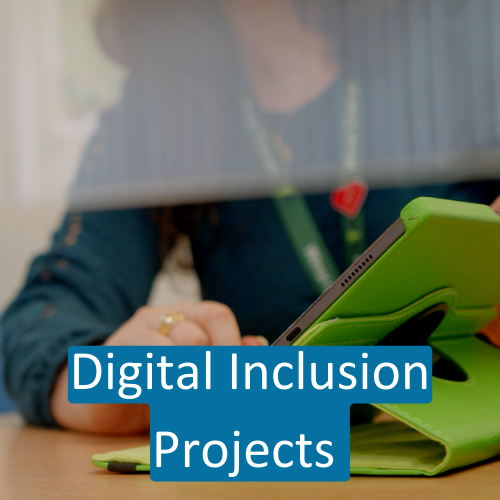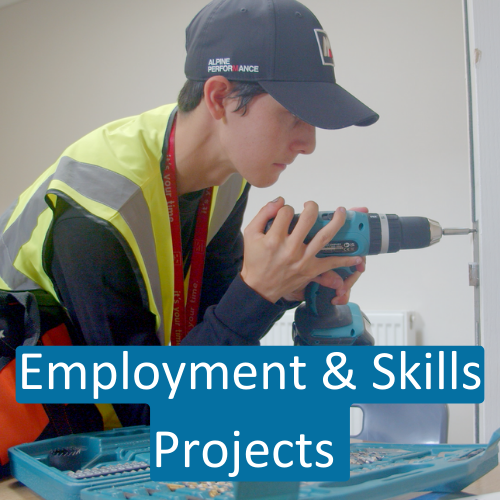Since the consortium was first set up in 2007 we have delivered multiple projects supporting thousands of people from across the Liverpool City Region (LCR) to gain skills and qualifications and move into further education or employment.
Digital Inclusion Projects
Not everyone in the city region has the skills, confidence or computer equipment they need to safely access the internet and the many vital services which can be accessed online. VOLA and our members deliver projects to support people who are digitally excluded:
Include IT Mersey Project
- The Include IT Mersey Project provides free Essential Digital Skills skills training to eligible digitally excluded people aged 16+ living in the Liverpool City Region.
- Initially funded through the European Social Fund (ESF) and The National Lottery Community fund from 2017 to 2023, the project is now funded through the Liverpool City Region UK Shared Prosperity Fund.
- Since it began, through basic IT courses, the project has supported over 3,000 digitally excluded people to develop basic digital skills and get online, 1,420 of whom have moved into employment, education/training, active job-search, or volunteering.
- The project has also supported many thousands of other people across the city region through its network of volunteer-led digital drop-ins.
- Both the ESF and UKSPF funded phases of the project have been independently evaluated, with extremely positive findings. Copies of each evaluation report can be downloaded here:
- UKSPF (2023-25) evaluation report
- ESF (2017-2023) evaluation report
- A suite of heartwarming case studies are available here…. and take a look at this great video!

UKSPF Digital Connectivity for Community Facilities Grants
- The UKSPF Digital Connectivity for Community Facilities Grant programme provided funding to LCR-based, Voluntary, Community, Faith and Social Enterprise (VCFSE) sector organisations to provide community access IT facilities between 2023 and early 2026.
- Since early 2023, the programme has made 213 grant awards to 188 local, grass-roots, not-for-profit community organisations across the Liverpool City Region, with £1,533,000 invested in supporting the development of 201 new or improved community digital facilities. A copy of the 2203-25 evaluation report is available on the project page.
- We have created an online map of places people can go to access the internet and IT Training across the Liverpool City Region.
Employment and Skills Projects
VOLA have delivered numerous projects to support economically inactive people who are aged 16+ as well as young people (generally aged 15-24) who are Not in Employment, Education or Training (NEET) to gain the skills and experience they need to move into further education or employment.
Youth Guarantee Trailblazer Community Grants Programme
Established as part of the the UK Government’s November 2024 Get Britain Working White Paper, the Youth Guarantee Trailblazers aim to test new and effective ways of supporting young people into employment, education, or training.
VOLA has been appointed by the Liverpool City Region Combined Authority to manage a voluntary sector Community Grants programme, aimed at supporting 18-21 year olds who are not in employment, education or training (NEET).
The 2025/26 grant round is now closed and all funding allocated. A further grants round will hopefully take place in spring/ summer 2026, subject to confirmation of continued funding.
You can find out more about this grants programme, the projects we have funded and how to make referrals on our YGT page.
The Progress Partnership (community-led employment support)
The Progress Partnership project has been funded by the UK Shared Prosperity Fund from 1st April 2024 to 31st March 2026 to provide Key Worker support for economically inactive residents of the Liverpool City Region (LCR) who are aged 16+. The aim of the project is to help them to overcome barriers that prevent them from actively looking for work. You can find out more about this project and the VOLA consortium members delivering on the project on our UKSPF Progress Partnership page.
Kickstart
Between April 2021 and September 2022, VOLA acted as Kickstart Gateway Body on behalf of a group of 20 local voluntary sector employers, successfully placing 71 young people into 6-month, paid work placements.
- 70% of young people progressed into a positive destination, comprising:
- 38% sustaining employment with their Kickstart employer
- 14% finding a job with a new employer
- 15% starting an Apprenticeship
- 3% moving in to higher education at University
New Futures
Led by Greenbank College (longstanding VOLA member) and delivered in partnership with 12 other consortium members, between April 2019 and July 2022, the New Futures project provided targeted support to 1,226 young people aged 15-24 who were Not in Employment, Education or Training (NEET), or at risk of becoming NEET, to help them to progress their learning and work goals.
- 85% of learners completed their programme of study
- 53% progressed into employment or further education
Prior to 2019…
The consortium delivered a range of NEET-focused projects, supporting over 3,500 young learners to develop new skills, confidence, ambition and to progress to further learning or employment. Alongside this, we delivered a wide range of community learning courses to nearly 3,000 adult learners, supported over 600 voluntary sector employers and ran a wide range of other skills and employment related projects.


